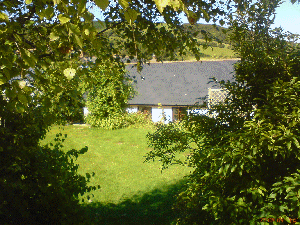When I opened my curtains this morning I gasped in awe at the scene in front of me. All the different leaves of the trees and bushes (cherry, beech, birch, forsythia, ash, blackthorn) - the flowers and plants (evening primrose, cranesbill, strawberry, iris, lady's mantle) - are decaying in their own time, at different rates and showing different colours, giving the most rich and glorious mottled effect like a Pointillist painting. The picture above, although not of the view from my window, gives you some idea.
This time last year, on an autumn walk, I was struck by the fact that the path I was walking was thick mud with discarded leaves trampled into it in places and littered here and there were acorns, beechnuts and sycamore seeds; the dying and the promise of new life both abundant. The following poem tries to express my meditation on this.
A Janus Time
Acorns and beechnuts are gracing the woods
while discarded leaves enshroud the land,
mulching the pathways yet to be walked
mulching the pathways yet to be walked
This is the
falling time, the time of seeds,
a Janus-time of living and dying,
a Janus-time of living and dying,
a threshold season.
In summer, apple-scented eglantine
frolicked in hedgerows,
yarrow and meadowsweet
brightened the verges,
an angelic presence on grey rainy days
frolicked in hedgerows,
yarrow and meadowsweet
brightened the verges,
an angelic presence on grey rainy days
but the wings of the sycamore fly to the future;
seeds spin our fate,
through them our lives are unfurled,
through them our lives are unfurled,
by them we are carried,
by them we are saved
by them we are saved
This is the
falling time, the time of seeds,
a Janus-time of living and dying
a Janus-time of living and dying
The offspring of plants will nurture our children,
so we are seedsmen, trading in hope,
or gamblers, reckoning the odds:
‘one for the rock and one for the crow,
one to die and one to grow’
one to die and one to grow’
glowing like hearth light, the promise in darkness
we live our lives on this juxtaposition,
the crux and cusp at the heart of being.
the crux and cusp at the heart of being.
This is the
falling time, the time of seeds
and now, like the trees, we are down at leaf,
heads heavy, we bend to face our roots,
feed on tubers, remember the past,
the rich earth opening -
heads heavy, we bend to face our roots,
feed on tubers, remember the past,
the rich earth opening -
what seeds do you carry that must answer the light?
**********
(I must just comment here since, I am aware that I am cross-posting on my blogs recently, that I don't intend to do this all the time of course but I've been finding it quite difficult to decide which blog to post these last few on (how to split oneself in half?) and so have put them up on both for now. I do have some posts in the pipeline which are more obviously appropriate for one or the other blog but for the time being I'll post to both when I'm undecided, although I might have to revise this in the longer term if the posts continue to converge more often than not.)


